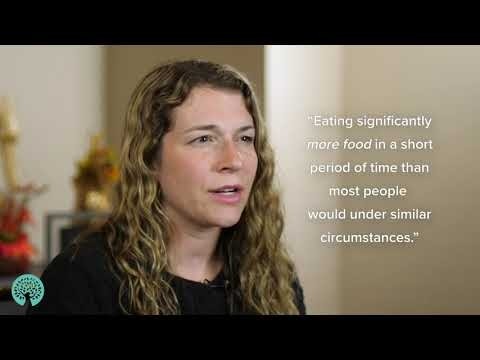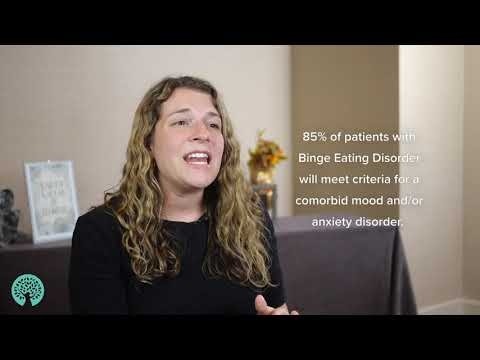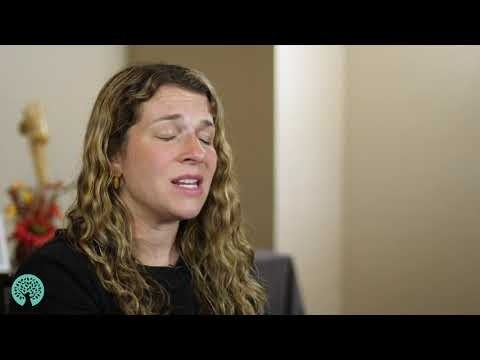
What is binge eating disorder?
People with binge eating disorder (BED) regularly eat a larger amount than others would eat within the same timeframe. They often have trouble stopping the binge and feel physically or emotionally upset afterward. Almost everyone overeats on occasion, such as eating past fullness when eating something we really enjoy. For some people, excessive eating that feels out of control and becomes a regular occurrence crosses the line to BED.

What causes binge eating?
There is no one single cause of binge eating disorder. BED is caused by a combination of genetic, psychological and social/cultural factors.

Genetic causes
Several factors explain why binge eating disorder may be more likely to occur within certain families:
- There are genetic and neurobiological eating disorder causes. If someone in your family has an eating disorder, you may be at a higher risk for an eating disorder.
- A complex set of hormones influences how we experience hunger and fullness, impacting our relationship with food.
Psychological causes
Psychological and emotional factors can lead an individual to binge eat. These traits are associated with a higher risk for developing an eating disorder, including BED:
- Low self-esteem
- Negative body image
- Feelings of inadequacy and loneliness
In addition, individuals with BED often struggle with co-occurring mood disorders and anxiety disorders, have experienced trauma, or struggle to navigate developmental milestones and life changes.
Social and cultural causes
The larger cultural narrative around dieting and weight loss, which has resulted in pervasive weight stigma, is a key socio-cultural factor influencing the development of BED.
This also contributes to the common misconception that BED only impacts people in larger bodies, and that people in larger bodies can’t have restrictive eating disorders. We know that eating disorders affect people of all shapes and sizes, and that you cannot tell whether someone has an eating disorder by looking at them.
These cultural messages can reinforce disordered thoughts and behaviors for those struggling with eating disorders, including BED, leading to feelings of shame and embarrassment around food and body image.
Read more on this topic:
Binge eating disorder symptoms
Binge eating disorder is characterized by frequent episodes of overeating (bingeing) – at least once a week over a period of three months. These binge episodes are also combined with feeling a lack of control and intense feelings of distress.

Warning signs of binge eating disorder
- Eating more rapidly than normal
- Eating until feeling uncomfortably full
- Eating large amounts of food even when not feeling physically hungry
- Eating alone because of feelings of embarrassment stemming from how much one eats
- Feeling ashamed, disgusted, depressed or guilty after eating
Consequences of binge eating
Just like with all eating disorders, you cannot tell whether someone has BED by looking at them. People who struggle with BED come in all shapes and sizes. However, when those with BED are living in larger bodies, they often face weight stigma when trying to access medical and behavioral health services and are dismissed with instructions to diet instead of diagnosing the eating disorder.
If you or someone you love struggles with binge eating, we hope you find comfort in knowing that you are not alone, and that recovery is possible. BED is the most common eating disorder in the United States, yet it remains widely misunderstood. underdiagnosed or misdiagnosed.

Health effects of binge eating
All eating disorders, including BED can impact every organ system in your body, including:
- Cardiovascular system
- Gastrointestinal system
- Nervous system
- Endocrine system
Weight stigma has shaped how the medical field has historically defined health risks associated with BED. Limited access to medical and behavioral health services can lead to delayed diagnosis, misdiagnosis, or lack of diagnosis and treatment for people in larger bodies.
Read 5 Self-Advocacy Tips for Fat Folks in Eating Disorder Recovery by Sharon Maxwell.
Binge eating disorder treatment
Binge eating disorder is the most common eating disorder. Thankfully, it is also treatable with specialized, evidence-based care.
Eating Recovery At Home, our virtual intensive outpatient program with specialized BED programming, offers a safe and inclusive healing environment to address binge eating and body image. Virtual care offers the added benefit of developing and practicing newly learned skills from the comfort and privacy of home.
Wondering how to stop binge eating? In a small community with others who share similar experiences around food and body image, you will learn and practice a consistent, mindful eating approach while building skills to manage binge eating behaviors.

What to expect with Eating Recovery At Home
- Three 3-hour weekly groups including:
- Focused groups featuring evidence-based binge eating disorder therapy (DBT, CBT, ACT, ERP, FBT, EFFT)
- Nutrition counseling and education include meal-time support, cooking classes and group meals to provide structure and accountability
- Process-oriented group therapy
- Behavior modification group therapy (exposures, behavioral activation)
- One weekly individual or family therapy session
- One weekly session with a registered dietitian
- Three weekly family educational groups
- Recovery Record mobile app tracks food intake, thoughts, emotions and behaviors
- Remote patient monitoring with numberless scale
- Continuing education options for all referents
- Weekly peer, alumni and caregiver support groups
We also work to identify and treat any co-occurring conditions that might be contributing to binge eating, including other forms of disordered eating. Many people with binge eating disorder also live with one or more of the following mental health conditions:
- Mood disorders
- Anxiety
- Obsessive-compulsive disorder (OCD)
- Substance use disorder
Find weight-inclusive care here
For far too long, people with BED, especially those in larger bodies, have been ushered into weight loss programs that often exacerbate the behavior they were seeking help for in the first place. The intentional restriction of food intake or addition of significant exercise only fuels feelings of shame around food and body image. This is not that experience.
Through re-education about health, weight and nutrition from a weight-inclusive perspective, we work with you to address the causes and impact of binge eating. Our programs teach mindful eating with an “all foods fit” approach and emphasis on body neutrality, helping you break free from food rules and diet mindsets for good.
Through our comprehensive binge eating disorder treatment program, we offer hope and understanding that binge eating is treatable. You can gain the freedom you deserve to live a meaningful, fulfilling life.
Get matched with the exact support you need.
With one conversation, our mental health professionals will help you better understand what you’re going through and what you need.
We will meet you where you are, listen to your story in a therapeutic setting, and match you with the level of support that meets your struggle.
Facts about binge eating disorder
In addition to understanding the causes and symptoms, it’s also helpful to understand the facts and statistics about BED.

- 2.2 percent of American adults suffer from binge eating disorder in their lifetime.1
- Approximately half of the risk for BED is genetic.2
- Nearly half of BED patients have a comorbid mood disorder.2
- More than half of BED patients have comorbid anxiety disorders.2
- Nearly 1 in 10 BED patients have a comorbid substance abuse disorder, most commonly alcohol use.2
- Binge eating or loss-of-control eating may be as high as 25 percent in post-bariatric patients.3
- Deloitte Access Economics. The Social and Economic Cost of Eating Disorders in the United States of America: A Report for the Strategic Training Initiative for the Prevention of Eating Disorders and the Academy for Eating Disorders. June 2020. Available at: https://www.hsph.harvard.edu/striped/report-economic-costs-of-eating-disorders/
- Ulfvebrand, S., Birgegard, A., Norring, C., Hogdahl, L., & von Hausswolff-Juhlin, Y. (2015). Psychiatric comorbidity in women and men with eating disorders results from a large clinical database. Psychiatry Research, 230(2), 294-299.
- Smith, K. E., Orcutt, M., Steffen, K. J., Crosby, R. D., Cao, L., Garcia, L., & Mitchell, J. E. (2019). Loss of control eating and binge eating in the 7 years following bariatric surgery. Obesity Surgery, 29(6), 1773-1780. https://www.ncbi.nlm.nih.gov/pmc/articles/PMC6948918/
Binge Eating Disorder Books
Overcoming Binge Eating, Second Edition: The Proven Program to Learn Why You Binge and How You Can Stop by Christopher G. Fairburn, MD
Find Online | Find at a Library
Gorge: My Journey Up Kilimanjaro at 300 Pounds by Kara Richardson Whitely
Find Online | Find at a Library
Eat What You Love, Love What You Eat How to Break Your Eat repent repeat Cycle by Michelle May, MD
Find Online | Find at a Library
Binge Eating Disorder — The Journey to Recovery and Beyond by Amy Pershing and Chevese Turner
Find Online | Find at a Library
Health At Every Size: The Surprising Truth About Your Weight by Lindo Bacon
Find Online | Find at a Library
Body Kindness: Transform Your Health from the Inside Out--and Never Say Diet Again by Rebecca Scritchfield
Find Online | Find at a Library
Binge Eating Disorder Podcasts
Frequently Asked Questions About Binge Eating
What is Binge Eating Disorder?
Binge eating goes beyond feeling “stuffed” or overeating on occasion, which is part of a normal pattern of eating. With binge eating disorder, binges become a regular occurrence, feel out of control and are followed by emotional distress, shame and embarrassment.
What is considered a binge?
A binge is defined as eating an “abnormally large” amount of food. But the amount of food consumed is less important than the level of distress you experience following a binge. What constitutes a binge is whether it is marked by significant emotional distress.
How do I know if I’m binge eating?
You may binge eat if you regularly eat more than most people would within the same time period, even if you’re not hungry. You may also eat until uncomfortably full. You may feel upset during or after a binge with feelings of guilt, shame, regret or lack of control.
How do I stop my binge?
You can learn how to stop binge eating with evidence-based, trauma informed care. Through Eating Recovery At Home, you’ll join a small community with others who share relatable experiences around food and body image. Together, you’ll learn and practice a mindful eating approach while building skills to manage binge eating behaviors.
What causes people to binge?
There are many biological, psychological and environmental factors that influence the development of eating disorders. 95 percent of patients with binge eating disorder have a family history of binge eating or substance use issues. Additional contributing factors include hormones, mood and anxiety disorders, traumatic experiences, and dieting/weight loss efforts.
What are the warning signs of binge eating disorder?
Warning signs of binge eating disorder include:
- Eating more rapidly than normal
- Eating until uncomfortably full
- Eating without feeling hungry
- Eating alone due to embarrassment or shame
- Feeling disgusted, depressed or guilty after eating
You may also notice extra food wrappers or fast-food receipts or signs of food hoarding.
How common is binge eating disorder?
Around 1.2% of adults in the U.S. have had binge eating disorder in the past year [1]. An estimated 3.5% of women and 2% of men experience binge eating disorder in their lifetime. [2] Worldwide, 1.5% of women and 0.3% of men experience binge eating disorder in their lifetime. [3]
[1] National Institute of Mental Health: Eating Disorders. (Accessed November 8, 2022).
[2] Hudson, J. I., Hiripi, E., Pope, H. G., & Kessler, R. C. (2007). The prevalence and correlates of eating disorders in the national comorbidity survey replication. Biological Psychiatry, 61(3), 348-358.
[3] Keski-Rahkonen, A. (2021). Epidemiology of binge eating disorder: prevalence, course, comorbidity, and risk factors. Current Opinions in Psychiatry, 34(6): 525-531.
Hide Last Child Layout Div









